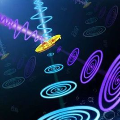Some quantum algorithms have "quantum speedups": improved time complexity as compared with the best-known classical algorithms for solving the same tasks. Can we understand what fuels these speedups from an entropic perspective? Information theory gives us a multitude of metrics we might choose from to measure how fundamentally 'quantum' is the behavior of a quantum computer running an algorithm. The entanglement entropies for subsystems of a quantum state can be analyzed for subsystems of qubits in a quantum computer throughout the running of an algorithm. Here, a framework for making this entropic analysis is constructed, and performed on a selection of quantum circuits implementing known fast quantum algorithms and subroutines: Grover search, the quantum Fourier transform, and phase estimation. Our results are largely unsatisfactory: known entropy inequalities do not suffice to identify the presence or absence of quantum speedups. Although we know our algorithms must have quantum "magic", the Ingleton inequality, which holds for all entropies of subsystems of stabilizer states, is not violated in any of our examples. In some cases, however, monogamy of mutual information, which is obeyed for product states but violated for highly entangled bipartite states such as the $GHZ$ states, fails at some point in the course of our quantum circuits.
翻译:暂无翻译



